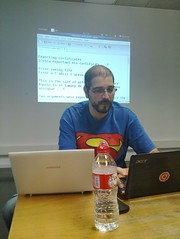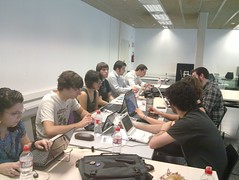Submitted by toniher on
A few weeks ago, Softcatalà (a non-profit organization devoted to bringing Internet and new technologies to Catalan speaking community in their own language) held its first open localisation session at Sagrada Família Civic Center. Our main aim was to offer to attendees the opportunity to know more closely the tools and criteria in our localisation processes and, ideally, also engage more volunteers to join our ongoing projects and share our values with them. In the past we had already organised some translation sessions (under the name of Marathons), but they were more focused to finish a huge pile of work (pending untranslated strings) rather than properly wooing potential collaborators, so only a few external people normally joined therefore.
Translation professionals and students, user support specialists and free culture/software activists, around 15 new people, came to this event.
It's still too early for evaluating whether this first effort will succeed to having more people collaborating in the localisation teams, but we can still point a few benefits after that session:
- Before, when preparing, and during the session, we became more conscious about our own actual processes. Hence we became aware of the steps where people get normally stuck (this includes our communication channels).
- By exchanging opinions between organisers and attendees, we learnt about some frequent translation errors that should be included in future versions of our existing documentation resources.
- After some pointed it to us, we discovered some of our resources were not 'correct'. This basically means material that we had lost from scope and we didn't even remember (essentially, unmaintained wiki pages).
We worked on GNOME (via Damned Lies) and Mozilla websites (via Verbatim) as session target projects.
Centring the discussion on the latter, we found Verbatim (Pootle) convenient enough since attendees did not need any other tool apart from their browser and their own skills. Although, in the end, we did not take full advantage from this, I think it is a worth asset since, for some projects, it offers the chance to check live recently submitted translations once the strings are approved (for instance, for Mozilla Addons and its stage website). A strong point was also comparing easily other language translations from within the same interface. This is very useful when the context of the string is not clear and other groups may have solved it before you (it could be tricky if they did not investigate either, though).
On the other hand, a short-come of the system, which we realised a few days after the session, is that we were missing email notifications from contributors submissions. If managers did not visit the website and contributors submissions remained unreviewed for a while, we risk they might become unmotivated and maybe not contributing anymore. As a workaround, we asked people to 'shout' at our mailing list when they considered so.
From this experience, now we have more hints about things which should work better.
Being again Mozilla-specific, we must say that many people wondered why we did not include the translation of popular applications such as Firefox and Thunderbird in the session schedule. We explained to them that the underlying processes we are following nowadays are too complex, so they do not fit as a good model and the experience could look too daunting. For Mozilla applications, Catalan contributors we are working too similarly to how program developers do (writing in terminal and pulling repositories). This is convenient if one of us ever contribute to any other part of Mozilla code, and in our technical careers, but it is at the same time an important barrier for contributors from a non-developer background. This puts the project in a high-stake situation if any of our experienced contributors ever stops or reduce his involvement. Because of this, in the following months, after all the rearrangement from the new Mozilla channels repositories (done for Firefox, but on the way for the other apps and components), we would like to move some components to a collaborative web environment and see how things work.
After summer, we expect to organise a second edition of this event. Hopefully, if by then we have managed to work out a more participatory translation process for Mozilla applications in our locale, I would share it with you.
More details








Comments
answer this topic
If you have a possibility to utilize the buy term papers service, don't hesitate, order research paper and take a rest.